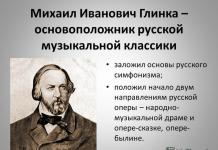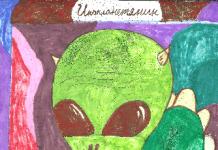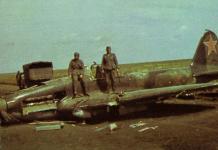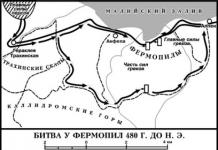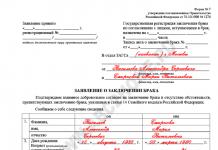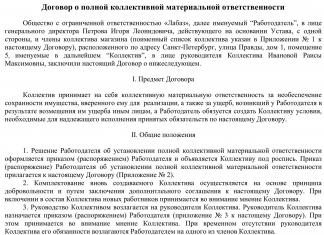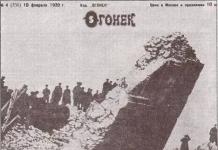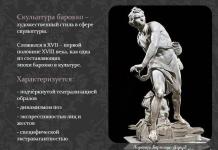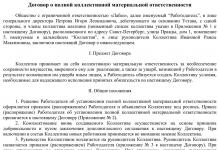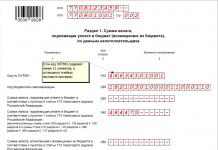Slide 1
Baratynsky Evgeniy Abramovich
1800-1844
Slide 2

Biography
Born on February 19 in the village of Mara, Tambov province, into a poor noble family. He came from an ancient Polish family that settled in Russia. In 1812 he entered the St. Petersburg Corps of Pages, from which in 1816 he was expelled for not entirely harmless boyish pranks without the right to enter any service other than soldiering. In 1819 he was enlisted as a private in the St. Petersburg Life Guards Jaeger Regiment.
Slide 3

Slide 4

Slide 5

Baratynsky’s first works appeared in print: messages “To Krenitsin”, “Delvig”, “To Kuchelbecker”, elegies, madrigals, epigrams. In 1820, the poem “Feasts” was published, which brought great success to the author. In 1820 - 26 Baratynsky served in Finland and wrote a lot. A prominent place in his work of this time is occupied by the elegy: “Finland”, “Disbelief” (“Do not tempt me unnecessarily...”), set to music by M. Glinka, “Waterfall”, “Two Shares”, “Truth”, “Recognition”, etc. Attempts by friends to achieve an officer rank for Baratynsky were for a long time met with the emperor’s refusal, the reason for which was the independent nature of the poet’s work, oppositional statements that could often be heard from Baratynsky.
Slide 6

He was not a Decembrist, but he was also captivated by ideas that were embodied in the activities of secret societies. His political opposition manifested itself in the elegy “The Tempest” (1825). In April 1825, Baratynsky was finally promoted to officer, which gave him the opportunity to control his destiny. He retired, married and settled in Moscow, where in 1827 a collection of his poems was published - the result of the first half of his work.
Slide 7

Muse I am not blinded by my muse: They will not call her a beauty, And the young men, seeing her, will run after her in a crowd of lovers. To lure with exquisite attire, the play of the eyes, brilliant conversation. She has neither inclination nor gift; But one is struck by a glimpse of the light of Her face, by the uncommon expression, by Her speeches by the calm simplicity; And he, rather than with caustic condemnation, will honor her with casual praise.
Slide 8

DISBELIEF Do not tempt me unnecessarily With the return of your tenderness: All the seductions of former days are alien to the disappointed! I don’t believe in assurances, I don’t believe in love, And I can’t indulge again in dreams that have once changed! Do not multiply my blind melancholy, Do not start a word about the past, And, caring friend, do not disturb the sick person in his slumber! I sleep, the sleep is sweet to me; Forget your old dreams: There is only excitement in my soul, And you will not awaken love.
Slide 9

In 1832, the magazine "European" began to be published, and Baratynsky became one of its most active authors. He turns to prose and drama. After the magazine closed (only two issues were published), he fell into hopeless melancholy. In 1835, the second edition of his works was published, which then seemed to be the result of his creative path. But Baratynsky’s last book was the collection “Twilight” (1842), which combined poems from the second half of the 1830s - early 1840s. In 1843, the poet, having gone abroad, spent six months in Paris, meeting with writers and public figures of France. In Baratynsky’s poems of that time there is cheerfulness and faith in the future
Slide 10

Baratynsky died suddenly on July 29, 1844 in Naples. More than a year later, his body was transported to St. Petersburg and, in the presence of several friends, interred. Newspapers and magazines of that time showed almost no response to his death. Only Belinsky said then: “A thinking person will always re-read Baratynsky’s poems with pleasure, because he will find a person in them - a subject eternally interesting to a person.” Baratynsky's humanism, his inherent subtlety of psychological analysis, the depth of his penetration into the contradictions of reality, and his noble mercilessness towards himself have made his poems close and necessary to our time.
1 slide
Evgeniy Abramovich Baratynsky Literary reading 4th grade Teacher: Guseva N.N. Municipal educational institution "Vertikosskaya secondary school"

2 slide
Years of life 1800 - 1844 Evgeny Baratynsky was born on March 2, 1800. In the Mara estate, Tambov province. The son of a retired lieutenant general from the inner circle of Emperor Paul I and the former maid of honor of Empress Maria Feodorovna

3 slide
At the age of 5, the boy learned to read and write in Russian, and at the age of 6 he spoke French and Italian well. Later he continued his studies in St. Petersburg, first at a private boarding school, and then at the Corps of Pages. For a long time he could not get used to life in St. Petersburg.

4 slide
Having fallen under bad influence, Baratynsky in 1816. committed a serious offense - took part in theft. The matter reached the king. For “unsuitable behavior” Baratynsky was expelled from the corps without the right to enter any service other than as a private in the army. in 1818 he entered military service as a private. Imperial Corps of Pages

5 slide
Attempts by friends to achieve an officer rank for Baratynsky were long met with the emperor’s refusal, the reason for which was the independent nature of the poet’s work. Only in April 1825, after almost seven years of military service at the lower rank, Baratynsky (on the recommendation of A.A. Zakrevsky) was finally promoted to officer, which gave him the opportunity to control his destiny.

6 slide
At this time, fate brought Baratynsky together with Delvig, who morally supported him, introduced him to Pushkin, and introduced him to writing circles. Baratynsky was very grateful to Delvig for this. Delvig A.A.

7 slide
In the autumn of 1843 Baratynsky and his family go on a trip abroad. Shortly before the trip, Baratynsky wrote a poem about the Muranovo estate near Moscow, where he lived in recent years before the trip.

8 slide
“Baratynsky,” asserted Pushkin, “is one of our excellent poets. He is original with us, because he thinks... he thinks in his own way... while he feels strongly and deeply.”

Slide 9
“Reading Baratynsky’s poems, you cannot deny him your sympathy, because this man, feeling strongly, thought a lot, and therefore lived, as not everyone is given to live,” Belinsky wrote about Baratynsky. Belinsky V.G.
People's Writer of Belarus. The uncompromising nature of Bykov's works. He lived abroad for several years. Monument to V. Bykov. Remain human in the flames of war. Memorable places. The truthfulness of books about war. Works by Vasil Bykov. Vasil Vladimirovich Bykov. Alpine ballad. Vasil Bykov was awarded the USSR State Prize.
“Blaginina” - What do you think about the girl. Poems read. Which poet will we meet today? The baggage cashier's daughter. Russian poet, translator. Conversation. Elena Aleksandrovna Blaginina. “Cuckoo”, “Kitten”. Biography and creativity of Elena Aleksandrovna Blaginina. Elena Alexandrovna came to children's literature in the early 30s. Reading the poem "Kitten". Working on poems.
"Konstantin Batyushkov" - Hereditary tendency. Batyushkov Konstantin Nikolaevich. Patriotic War of 1812. Service. Philosophy of the poet. The birth of a great poet and prose writer. Front-line poet. Creation. Collection of Batyushkov. Belinsky. Love to motherland. Discoveries in literature.
“Balmont’s verse “Snowflake”” - Keep your soul pure. Azure. End of the road. Snowflake. Konstantin Balmont. Don't make others angry, and don't be angry yourself. Unexpected twists of fate. A pure soul. Winter in paintings. Working on a poem. The road is long. Gray-haired housewife. Wind. Konstantin Dmitrievich Balmont. Unknown country. Glides in the shining rays. Text. Soul. Stormy road.
"White" - Born. First date. Bely meets the Symbolists. Gets close to the Solovyov family. Borya Bugaev in childhood. He graduated from the best private gymnasium in Moscow in 1899. Goes abroad. Begins correspondence with A. Blok. Returns to his homeland. Last years of life. Death of a writer. Literary genre. Marries Asa Turgeneva. The beginning of a new period of creativity. Boris Nikolaevich Bugaev. Andrey Bely. The first poetry collection.
“The Life of Vitaly Bianki” - Fairy tales and stories. The need for artistic embodiment of knowledge. Gymnasium. Works. Forest houses. Bianchi participated in scientific expeditions. Thematic cycles. Creation. Plants and animals. Children's story by Bianca. Vitaly Bianchi. Orange neck. Forest storyteller.
BARATYNSKY Evgeniy Abramovich - poet, representative of the Pushkin galaxy. From an old Polish family that settled in the 17th century. in Russia. Baratynsky received his upbringing initially in the village, under the supervision of an Italian uncle, then in the St. Petersburg French boarding house and page corps. As a result of a serious offense - the theft of a fairly large sum of money from the father of a comrade - he was expelled from the corps and prohibited from entering service forever. This punishment greatly shocked Baratynsky (he suffered from a serious nervous disorder and was close to suicide) and left an imprint on his character and subsequent fate. In order to remove the burdensome stigma, Baratynsky entered one of the St. Petersburg regiments as a private. Baratynsky served in the lower rank for seven years (five of them in Finland) and only in 1825 was promoted to officer. After production he retired; in subsequent years he lived either in Moscow or on his estates. He died during a trip abroad, in Naples, at the age of 44.
About the spelling of the poet's surname The surname Boratynsky comes from the name of the castle in Galicia - Boratyn, which means "God's defense", which was built in the 14th century by the Boratynsky ancestor Dmitry Bozhedar. Therefore, it is more correct to write his last name as its owner himself wrote, that is, with an “O”.

The poet's childhood Boratynsky was born on February 19 (March 2), 1800 in his father's estate Mara near Tambov. His father came from an old Polish family, his mother was a maid of honor to Empress Maria Feodorovna. Under the guidance of an Italian tutor, the parents gave their son a wonderful education. Since childhood, the boy already knew French, Italian, German and Russian so well that he could read independently, and by the age of eight he could write letters fluently in these languages.

Subsequently, Evgeniy Abramovich expressed gratitude to the tutor in his last poem “To the Italian Uncle.” There are lines there: “You gave me the grace of non-Russian supervision... Thanks to the gods, with you after this, we were not strangers to each other for twenty years...”

After the death of his father, Boratynsky's closest person was his mother, Alexandra Fedorovna. A determined and energetic woman, after the death of her husband, took upon herself the entire burden of managing a large family and estate. Then, while studying at the St. Petersburg Corps of Pages, Boratynsky wrote her very warm and eloquent letters, from which one can judge the character of the future poet: nobility, tender affection for loved ones, a tendency to melancholy, pessimism and the inability to quickly get along with people.

A dark spot on the fate of the future poet The mother tried her best to help her son, to give him all the best. But, as often happens, remaining deaf to Eugene’s request to assign him to the naval department, made his life miserable. Having become close to some of his comrades, Boratynsky took part in serious pranks, one of which bordered on crime - stealing 500 rubles and a tortoiseshell snuffbox in a gold frame from the father of one of his fellow students. Carelessness led to his expulsion from the corps with shame and scandal, with a ban on entering public service, except as a military private. Boratynsky was then 15 years old.


Chronicles of the poet's service In 1819, he enlisted as a private in the Life Guards Jaeger Regiment, stationed in St. Petersburg. In 1819, he entered the Life Guards Jaeger Regiment as a private in St. Petersburg. In 1820 he was promoted to non-commissioned officer and served in the Neishlot regiment in Finland, in the fortification of Kyumen and its environs. In 1820 he was promoted to non-commissioned officer and served in the Neishlot regiment in Finland, in the fortification of Kyumen and its environs. In the fall of 1824, Boratynsky received permission to come to Helsingfors (then name of Helsinki) and be at the corps headquarters of General Zakrevsky. In the fall of 1824, Boratynsky received permission to come to Helsingfors (then name of Helsinki) and be at the corps headquarters of General Zakrevsky. In 1825 he was finally promoted to officer. In 1825 he was finally promoted to officer. And in January 1826, the “singer of feasts” (Pushkin’s expression) retired and settled in Moscow. And in January 1826, the “singer of feasts” (Pushkin’s expression) retired and settled in Moscow.

Service in St. Petersburg During his service in St. Petersburg, Evgeniy Abramovich shared an apartment with Baron Anton Delvig, who became his best and dearly beloved friend. They prepared simple dinners together, wandered around the neighborhood, talked about literature, wrote poems, humorous and serious... For example, these lines: For example, these lines: Where the Semenovsky regiment, in the fifth company, in a low house, lived the poet Boratynsky with Delvig, also a poet, they lived quietly, paid little rent, had to go to the shop, rarely dined at home. Which later became their calling card, were enthusiastically quoted by Pushkin himself by heart. Which later became their calling card, were enthusiastically quoted by Pushkin himself by heart. At the same time, Boratynsky met Denis Davydov, Chaadaev, and Pletnev. At one of the evenings at the literary salon (which the young poet attended at Pletnev’s invitation), Boratynsky met the already famous Alexander Pushkin. At the same time, Boratynsky met Denis Davydov, Chaadaev, and Pletnev. At one of the evenings at the literary salon (which the young poet attended at Pletnev’s invitation), Boratynsky met the already famous Alexander Pushkin.

Service in Finland Service in Finland and, in particular, the beauty of Finnish nature prompted the aspiring genius to create the poem “Eda”, about which Pushkin spoke so flatteringly: “What a charm this “Eda” is! Our critics will not understand the originality of the story... But what a variety!" Also in Finland, he became friends with N.V. Putyata, a friendship with whom the poet remained for the rest of his life. Putyata very accurately described Boratynsky’s appearance at that time: “He was thin, pale, and his features expressed deep despondency.”

Stay in Helsingfors His life in Helsingfors was bright, noisy and hectic. His infatuation with the beautiful Agrafena Fedorovna Zakrevskaya, the wife of the Governor General, brought Boratynsky many painful experiences and inspired him to create a whole series of poems, which later became romances. I smoked incense for others. But I carried you in the shrine of my heart; I prayed to new models, but with the anxiety of an old believer. (“Confidence” year)

Promotion to officer gave Boratynsky the right to retire. Taking advantage of it, the poet left for Moscow, where he married Anastasia Lvovna Engelhardt, a person who managed to attract the sad and thoughtful poet to herself. After the release of the poem "Ball", Boratynsky finally receives all the fame he deserved. In his Foresight he wrote: My gift is poor, and my voice is not loud, But I live, and my existence on earth is kind to someone: My distant descendant will find him in my poems; who knows? My soul will be in intercourse with his soul, And just as I found a friend in a generation, I will find a reader in posterity. And the lines turned out to be very prophetic.

The full glory that came with it led Boratynsky to meet many interesting people, among whom was Vyazemsky, who later wrote about the poet: “The more you rub him, the better and stronger he smells. In addition to his talent, he has a dense and beautiful foundation!” However, this glory did not last long. After the unsuccessful release of the poem “The Concubine,” the poet withdraws into himself and writes on the table. “Let us close ourselves in our circle, like the first Christian brothers... Let us write without printing.” (letter to I. Kireyevsky dated March 14, 1832.)

The last collection The third, last collection of poems, Boratynsky published in 1842 and dedicated it to P. Vyazemsky. It was called “Twilight” and included 26 poems, distinguished by philosophical thoughts unusual for Russian poetry. The through-line lyrical image of the book: the tragic awareness of a person’s loneliness in a deaf world and the passionate need for the response of “another soul.” The appearance of "Twilight" was compared by critics to "a ghost suddenly appearing on the street, with a shadow among the perplexed faces of posterity." The through-line lyrical image of the book: the tragic awareness of a person’s loneliness in a deaf world and the passionate need for the response of “another soul.” The appearance of "Twilight" was compared by critics to "a ghost suddenly appearing on the street, with a shadow among the perplexed faces of posterity." Boratynsky was called a bright, wonderful poet, whose thoughts are “completely alien to our generation.”

Departure Life after the death of his brilliant friend, Alexander Pushkin, became painfully difficult and immobile for him, which is destructive for the poetic soul. Few of his friends completely distanced themselves from him. Deciding to unwind, in the fall of 1863 he went abroad with his wife and three children. His travel route: Berlin - Leipzig - Dresden - Paris.

Death of a Poet The winter of the year takes place in Paris. Life begins to attract Boratynsky with bright colors and new horizons. He even expects to return home “cured of many prejudices.” But, after living in Naples for two months, full of ideas and plans, on June 29, 1844, as a result of an unexpected cerebral hemorrhage, shocked by a nervous attack that happened to his wife, the poet suddenly dies. 31 On August 1845, Boratynsky was interred in the Alexander Nevsky Lavra. The life circle of twilight and enlightenment silently closed.



